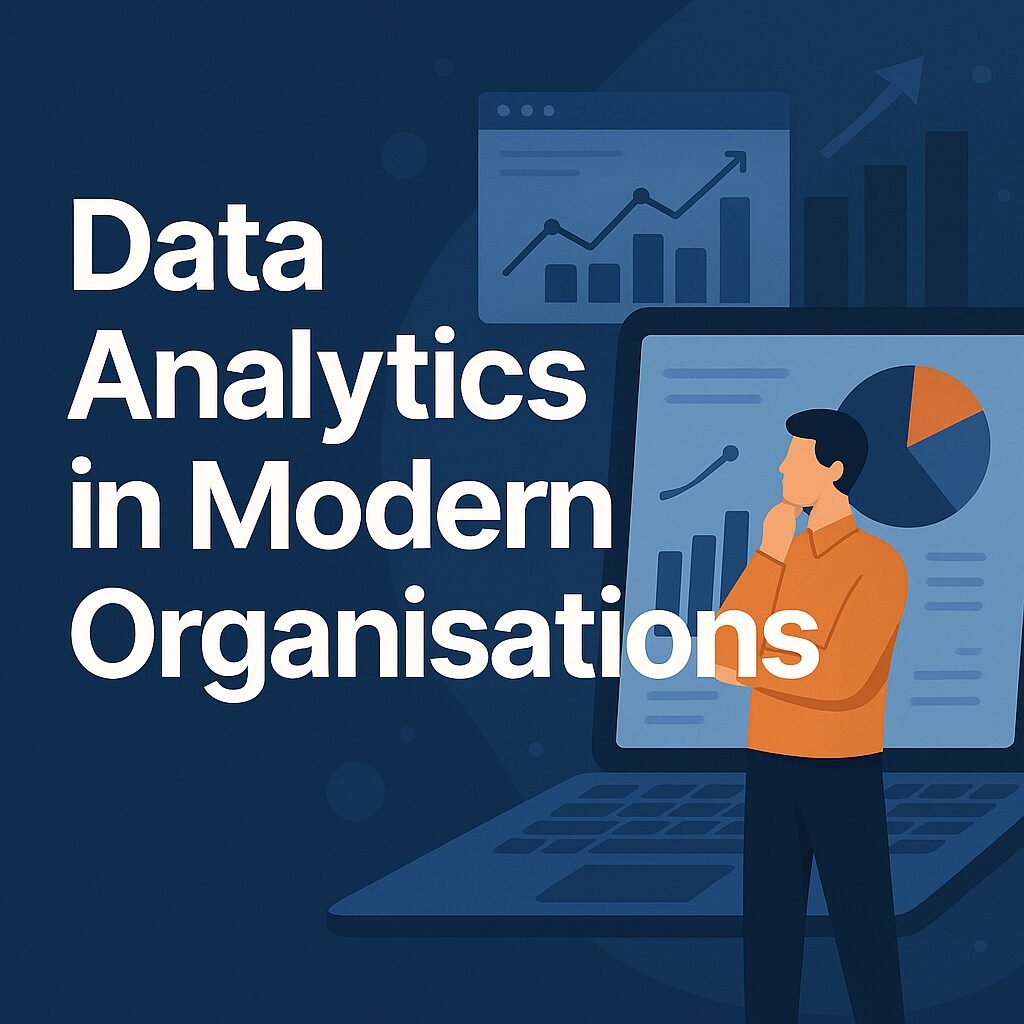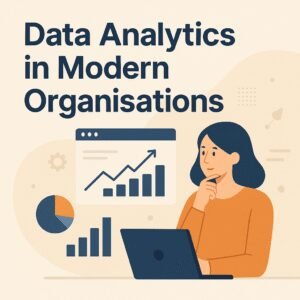![]()
![]()
In today’s fast-paced and highly competitive business environment, decision-making must be both rapid and accurate. As organisations grapple with massive volumes of information, data analytics has emerged as a powerful tool that turns raw data into strategic insight. With the rise of big data, artificial intelligence (AI), and machine learning, the demand for data-driven decision-making has grown tremendously. The phrase “Data Analytics in Modern Organisations” captures the essence of how companies use analytical methods to gain a competitive edge and drive success.
Understanding Data Analytics
At its core, data analytics involves examining datasets to uncover patterns, correlations, and trends. These insights help businesses make informed decisions rather than relying on guesswork or intuition. There are four primary types of data analytics: descriptive, diagnostic, predictive, and prescriptive. Each plays a unique role in enhancing organisational understanding and foresight.
- Descriptive analytics summarises historical data to identify what has happened in the past.
- Diagnostic analytics digs deeper to understand why something happened.
- Predictive analytics uses historical data to forecast future outcomes.
- Prescriptive analytics suggests actions to benefit from predicted outcomes.
By leveraging these approaches, companies can refine their strategies, improve operations, and better understand their customers.
Read More: UK Job Search Red Flags: What to Watch Out For
The Growing Importance of Data Analytics in Modern Organisations
Modern organisations face the challenge of sifting through an overwhelming amount of information generated from multiple sources. From customer transactions and website traffic to social media interactions and supply chain logistics, data is constantly being produced. Consequently, businesses that effectively harness this data are better positioned to compete, innovate, and grow.
In particular, Data Analytics in Modern Organisations plays a critical role in:
- Enhancing Customer Experience: Analytics provides insights into customer behavior, preferences, and pain points. Companies can tailor their services, personalise marketing efforts, and improve customer satisfaction based on data.
- Optimising Operations: By identifying inefficiencies and predicting potential disruptions, businesses can streamline operations and reduce costs. For instance, logistics companies use analytics to optimise delivery routes and inventory management.
- Driving Innovation: Organisations can identify market trends and emerging opportunities through data analysis. This proactive approach helps companies stay ahead of competitors and develop innovative products and services.
- Supporting Strategic Decision-Making: Executives use dashboards and real-time data visualisations to make timely and informed decisions. Analytics enables scenario planning and risk assessment, providing a solid foundation for long-term strategies.
- Improving Financial Performance: Data analytics allows for better budgeting, forecasting, and performance monitoring. Finance teams can spot discrepancies early and allocate resources more effectively.
Real-World Applications of Data Analytics
Numerous industries have successfully integrated data analytics into their core operations. Let’s explore how this transformation is occurring in different sectors:
- Healthcare: Medical providers use analytics to track patient outcomes, improve diagnoses, and optimise treatment plans. Predictive models help in anticipating disease outbreaks and managing resources.
- Retail: Retailers analyse customer data to determine buying habits, plan inventory, and develop targeted promotions. Personalised shopping experiences are made possible through data analytics.
- Manufacturing: Analytics helps manufacturers monitor equipment performance, reduce downtime, and improve quality control. Data-driven insights support supply chain efficiency.
- Finance: Banks and financial institutions rely on analytics to detect fraud, assess credit risk, and make investment decisions. Real-time data helps in monitoring market conditions and compliance.
- Education: Educational institutions use data to improve student performance, tailor learning experiences, and manage administrative tasks more efficiently.
As evident, the impact of Data Analytics in Modern Organisations spans across all sectors, revolutionising how business is conducted.
Key Tools and Technologies in Data Analytics
The rapid development of technology has significantly enhanced the scope of data analytics. Several tools and platforms are available to assist organisations in collecting, processing, and analysing data effectively:
- Data Visualisation Tools (e.g., Tableau, Power BI): These tools transform complex data sets into easily digestible visuals.
- Statistical Analysis Tools (e.g., R, SAS): They enable in-depth quantitative analysis and hypothesis testing.
- Machine Learning Platforms (e.g., TensorFlow, Scikit-learn): These tools help in building models that predict outcomes and automate decisions.
- Data Warehouses (e.g., Snowflake, Amazon Redshift): They store large volumes of structured data for easy querying and reporting.
- Big Data Technologies (e.g., Hadoop, Spark): These systems manage and process vast datasets efficiently.
Using the right tools ensures that organisations can gain the most value from their data assets. Moreover, the integration of AI and machine learning enhances the predictive and prescriptive capabilities of analytics systems.
Read More: From Leads to Loyalty: Building a Sales Funnel That Converts & Retains
Challenges and Considerations
Despite the many benefits, implementing data analytics is not without challenges. Organisations must navigate issues such as:
- Data Privacy and Security: Protecting sensitive information and ensuring compliance with regulations like GDPR is crucial.
- Data Quality: Inaccurate or incomplete data can lead to flawed analysis and poor decision-making.
- Skill Gaps: There is a growing demand for data scientists and analysts who can interpret data correctly.
- Integration with Legacy Systems: Aligning analytics tools with existing infrastructure can be complex and costly.
Addressing these challenges requires a strategic approach. Businesses should invest in staff training, adopt strong data governance policies, and continuously update their technologies.
The Future of Data Analytics in Modern Organisations
Looking ahead, the role of data analytics will only become more central to organisational success. As technology continues to evolve, we can expect greater automation, real-time insights, and more sophisticated decision-making models. Trends such as augmented analytics, which leverages AI to assist users in data discovery and interpretation, will make analytics more accessible to non-experts.
Moreover, as remote work and digital transformation accelerate, organisations will increasingly rely on analytics to maintain productivity, monitor employee performance, and adapt to changing market conditions.
Conclusion
In conclusion, data analytics serves as a bridge between information and impactful action. By converting raw data into meaningful insights, businesses can improve customer experiences, streamline operations, and make informed strategic decisions. The phrase “Data Analytics in Modern Organisations” embodies a transformative shift—one where data is not merely a byproduct of business but a central driver of innovation and growth.
Therefore, companies that embrace data analytics and overcome associated challenges will be better equipped to thrive in the data-driven world of tomorrow. It is no longer a choice but a necessity for modern organisations to harness the full potential of analytics and move confidently from data to decisions.
Get an internship opportunity in the United Kingdom & join a wide professional network to unlock opportunities! Join us: www.stunited.org
Get Personal Branding to boost your CV and get optimum job and interview assistance: www.brandme4job.com
Contact us to get Career Assistance in the UK: Call Us Now!





Responses